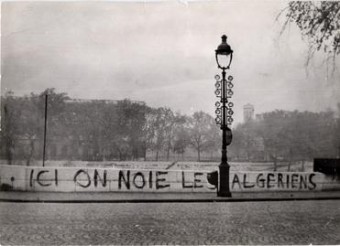This Day in History: October 17th- Maurice Papon and a Massacre
Today in History: October 17, 1961
 In the late evening hours of October 17, 1961, 30,000 Algerians were demonstrating throughout the city of Paris to protest a curfew imposed upon them earlier in the month by the city’s police chief. Before the night was over, at least 200 Algerians died at the hands of the Paris police.
In the late evening hours of October 17, 1961, 30,000 Algerians were demonstrating throughout the city of Paris to protest a curfew imposed upon them earlier in the month by the city’s police chief. Before the night was over, at least 200 Algerians died at the hands of the Paris police.
Violent exchanges had become common between the Parisian contingent of the Algerian National Liberation Front (FLN) movement, whose mission was to free Algeria from colonial rule, and the French police. Over a period of three months, 20 police officers had been killed.
This did not sit well with Maurice Papon, Chief of Police of Paris, whose other claim to fame was his past as a Nazi collaborator, among other atrocities. He was determined to find the FLN members responsible, and to crush their organization for good.
Papon proclaimed that the police would return “10 blows to every Algerian blow”, and he was as good as his word. He ordered raids on their communities, enacted the aforementioned curfew, and executed five Algerians who reportedly were not even connected to the FLN.
The Algerian community rose in defiance of these actions. 30,000 Algerians, mostly citizens of France, converged around the great landmarks of Paris including the Place de la Concorde, the Champs-Elysées and the Eiffel Tower.
The police sprang into action. Thousands of people were herded up and bussed to holding centers. Hundreds were brutally beaten and murdered in cold blood by officers who were free from the danger of prosecution thanks to the protection of their boss – Police Chief Maurice Papon.
In 1998, Raoul Letard, a police officer on duty that evening, described a 2-hour search for Algerians in suburbs of Colombes, “We were waging war, and our adversary had been named as the Algerians.”
The official numbers the police released the next day were 3 dead and 67 wounded from the incident, but this figure was immediately discounted by anyone unlucky enough to witness the dead bodies littering the city and floating down the Seine. Philosopher Simone de Beauvoir recalled in her memoirs Force of Circumstance:
The police waited for the Algerians to come up out of the métro stations, made them stand still with their hands above their heads, then hit them with truncheons.
Corpses were found hanging in the Bois de Boulogne, and others, disfigured and mutilated, in the Seine. Ten-thousand Algerians had been herded into the Vél d’Hiv [stadium], like the Jews in Drancy once before.
Again I loathed it all – this country, myself, the whole world.
No judicial inquiry was ever made. Most French citizens blamed the deaths on Algerian in-fighting and terrorism. Maurice Papon was brought to trial for crimes against humanity – for his actions during World War II. He never had to answer for the atrocities he committed against the Algerians in 1961.
It wasn’t until 2001 that the French government would even acknowledge that a massacre had occurred.
If you liked this article, you might also enjoy our new popular podcast, The BrainFood Show (iTunes, Spotify, Google Play Music, Feed), as well as:
- The Decidedly Non-French Origin of French Toast
- The Largely Forgotten Los Angeles’ Chinese Massacre
- How the French Flag came to be as it is Today
- The Evolution of the French Language
Bonus Facts:
- Besides his conduct in this massacre, which only partially came to light during his lifetime, the French Legion of Honour recipient Maurice Papon was later stripped of all such awards and imprisoned when his activities during the Nazi rule of France came to light, such as his collaboration with the Nazis on tracking down and removing Jews from France (of which 1,690 were removed under his watch). He even at one point was involved in organizing the trains to send the Jews off to the concentration camps. Besides that, he was directly involved in selling off the assets of a portion of the deported Jews. When these actions came to light, he sued many of the descendents of the Jews he’d helped deport for, what he claimed, was defamation. Not surprisingly, he lost those suits.
- Once it became clear the Germans were going to lose WWII, Papon switched sides and started helping the French resistance.
- Papon was forced to resign his position with the French police due to later abuses of his power in the mid-1960s, again separate from this massacre which he’d helped cover up, such as his theorized involvement in the disappearance of the leader of the Tricontinental Conference in 1965, Mehdi Ben Barka. It is thought that the police killed him. That said, Papon went on to hold a few different government offices including Minister of the Budget, before his WWII exploits started coming to light in 1981.
| Share the Knowledge! |
|




